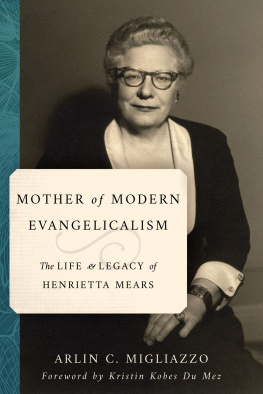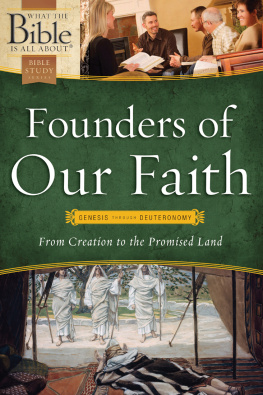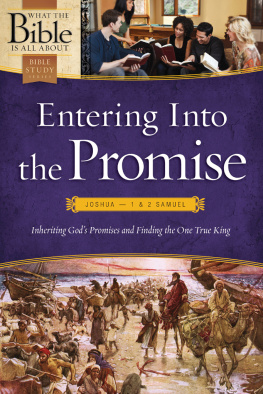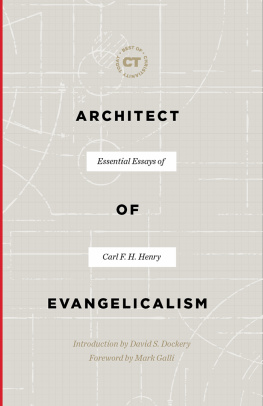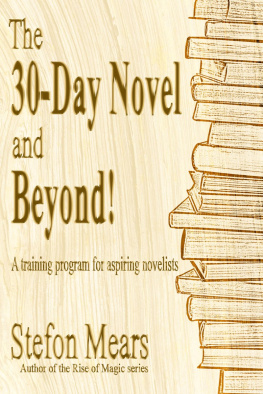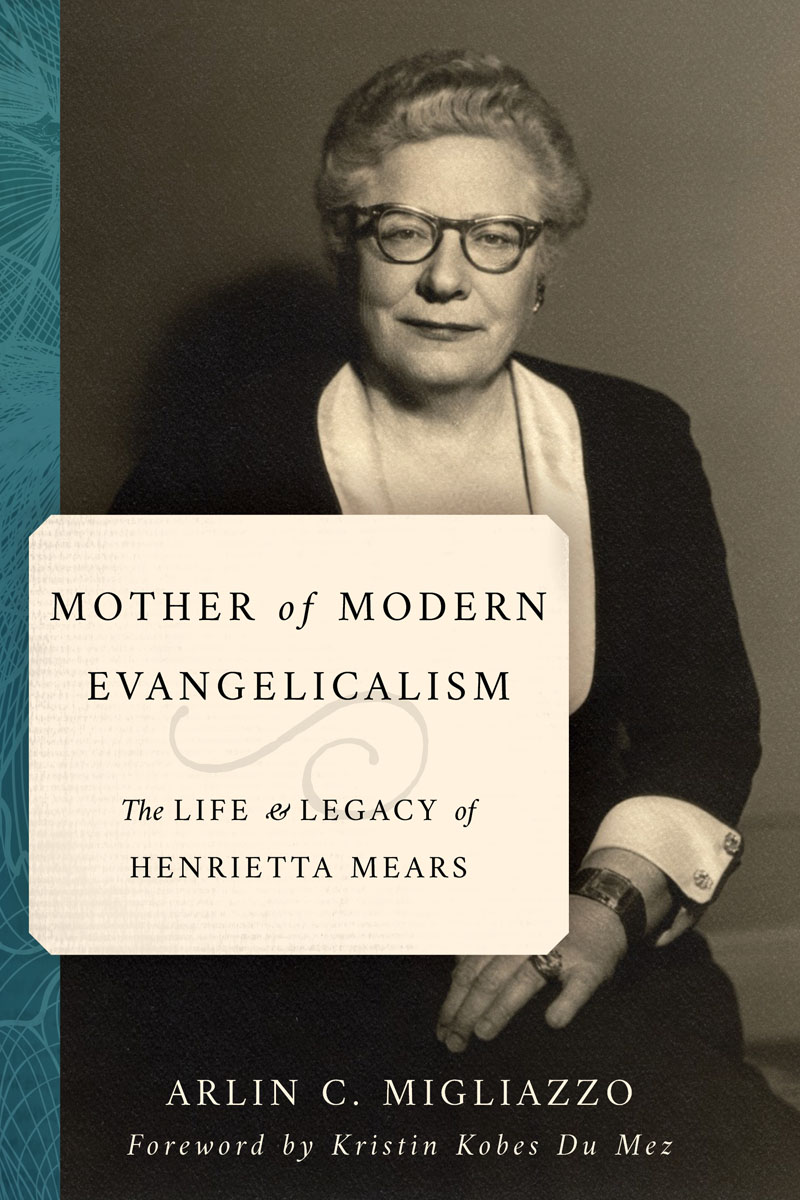
This deeply researched and lucidly written volume illumines the life of one of the most important but least examined figures in the early history of American (and world) evangelicalism. The continuities between Mearss multiple contributions and the far more heralded career of Billy Graham, for example, are simply astonishing. Migliazzo writes with empathetic yet not uncritical engagement. He provides a wonderful addition to our understanding of American religious history in general, and to the history of women in the formation of evangelicalism in particular.
GRANT WACKER
author of One Soul at a Time: The Story of Billy Graham
Historians have long recognized that Christianity in America has been strengthened, if not sustained, by women. Yet, when it comes to twentieth-century evangelicalism, most of the stories we tell focus on strong male characters. Arlin Migliazzo joins a growing number of scholars who are trying to correct this narrative. He has convinced me that all future accounts of modern evangelicalism must place a California Sunday school teacher at the center. This well-researched and accessible biography of Henrietta Mears is a game-changer.
J OHN FEA
author of Believe Me: The Evangelical Road to Donald Trump
We have long needed a scholarly biography of Henrietta Mears, one of the most influential womenand educatorsin modern American evangelicalism. Migliazzo has given us one that is readable, chock-full of detail, and centered on Mearss passion for Christian education. As director of a wildly popular ministry at First Presbyterian Church of Hollywood, she built bridges connecting leading conservative Protestants both to each other and to the wider culture. Mears thus emerges as one of the chief architects of todays evangelical church.
ANDREA L. TURPIN
author of A New Moral Vision: Gender, Religion, and the Changing Purposes of American Higher Education, 18371917
In this riveting and deeply researched book, Arlin Migliazzo traces the compelling life of Henrietta Mears, one of the most important and under-appreciated leaders of modern American evangelicalism, and demonstrates how she transformed religion and Christian education in the United States.
MATTHEW A. SUTTON
Washington State University
LIBRARY OF RELIGIOUS BIOGRAPHY
Mark A. Noll, Kathryn Gin Lum, and Heath W. Carter, series editors
Long overlooked by historians, religion has emerged in recent years as a key factor in understanding the past. From politics to popular culture, from social struggles to the rhythms of family life, religion shapes every story. Religious biographies open a window to the sometimes surprising influence of religion on the lives of influential people and the worlds they inhabited.
The Library of Religious Biography is a series that brings to life important figures in United States history and beyond. Grounded in careful research, these volumes link the lives of their subjects to the broader cultural contexts and religious issues that surrounded them. The authors are respected historians and recognized authorities in the historical period in which their subject lived and worked.
Marked by careful scholarship yet free of academic jargon, the books in this series are well-written narratives meant to be read and enjoyed as well as studied.
Titles include:
A Short Life of Jonathan Edwards
by George M. Marsden
One Soul at a Time: The Story of Billy Graham
by Grant Wacker
Harriet Beecher Stowe: A Spiritual Life
by Nancy Koester
For a complete list of published volumes, see the back of this volume.
Wm. B. Eerdmans Publishing Co.
4035 Park East Court SE, Grand Rapids, Michigan 49546
www.eerdmans.com
2020 Arlin C. Migliazzo
All rights reserved
Published 2020
Printed in the United States of America
26 25 24 23 22 21 20 1 2 3 4 5 6 7
ISBN 978-0-8028-7792-5
Library of Congress Cataloging-in-Publication Data
Names: Migliazzo, Arlin C., 1951author.
Title: Mother of modern evangelism : the life and legacy of Henrietta Mears / Arlin C. Migliazzo.
Description: Grand Rapids, Michigan : William B. Eerdmans Publishing Company, 2020. | Series: Library of religious biography | Includes bibliographical references and index. | Summary: The full life story of Henrietta Mears and an overview of her impact on modern American evangelicalismProvided by publisher.
Identifiers: LCCN 2020022484 | ISBN 9780802877925
Subjects: LCSH: Mears, Henrietta C. (Henrietta Cornelia), 18901963. | PresbyteriansUnited StatesBiography. | Sunday-school teachersBiography. | EvangelistsUnited StatesBiography.
Classification: LCC BX9225.M397 M53 2020 | DDC 268.092 [B]dc23
LC record available at https://lccn.loc.gov/2020022484
for all the saints who from their labors rest.
Contents
Foreword
Quite simply, Henrietta Mears belongs at the center of any history of twentieth-century American evangelicalism.
Although never the public face of the movement, Mears was one of the most powerful behind-the-scenes operators during the critical midcentury decades when evangelicalism emerged as a formative religious and cultural movement. If evangelicalism is a network, Mears was the hub. As Arlin Migliazzo demonstrates in this meticulously researched account, it was Mears who helped define the contours of the movement, even as she embodied many of the tensions that afflict American evangelicalism to this day.
A product of William Bell Rileys Minneapolis First Baptist Church, Mears adhered to a fundamentalist theology. But she parted ways with fundamentalists when it came to their reactionary anti-intellectualism and their separatist instincts. Confident that the truth of the Christian gospel could transform even the most resistant outposts, Mears embraced modern culture as her mission field. Less judgmental than many of her peers, Mears modeled a fearless, often gracious evangelistic enterprise that expanded the evangelical footprint and enhanced its cultural relevance.
In many ways, Mears was a pioneering figure. As early as the 1920s, Mears was advancing a transdenominational, outward-facing conservative Protestantism. When fundamentalists came together in the 1940s to rebrand their movement, Mears had already perfected the brand. Even before the establishment of the National Association of Evangelicals in 1942, Mears had established herself as a key figure in constructing the scaffolding that would support the national movement. Moreover, Mears had relocated to southern California decades before the region became the crucible of postwar American evangelicalism. It was there, in the shadow of Hollywood, that Mears would facilitate the rise of Billy Grahams career, and with it, help establish the trajectory of twentieth-century American Protestantism. Other Mears boys included Bill Bright, founder of Campus Crusade for Christ, and Jim Rayburn, founder of Young Life, along with countless lesser-known figures who would play critical roles in expanding the evangelical movement across the nation and around the world.
Mears accomplished all this as a Sunday school teacher.
By teaching, rather than preaching, Mears deftly maneuvered around the constraints conservative Protestant theology placed upon women. She would not occupy a pulpit on a Sunday morning, but she might well expound from behind the same pulpit on a Sunday evening. She trained thousands of students in biblical knowledge and evangelism, founded her own publishing house, and mentored hundreds of ministry leaders, but she did so without fundamentally challenging the gendered power structures of midcentury evangelicalism. Even so, in her role as teacher and administrator she was neither quiet nor submissive; outspoken and forceful, she could be unrelenting in her exacting leadership. Mears, then, walked the fine line that subsequent generations of evangelical women would come to know well. Staying within prescribed boundaries, she was able to exert enormous influence throughout the evangelical world.
Next page
